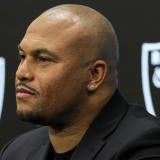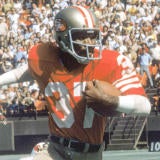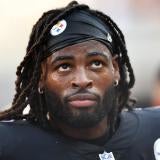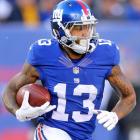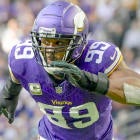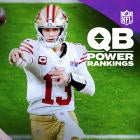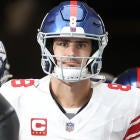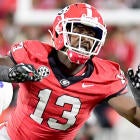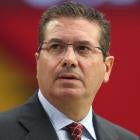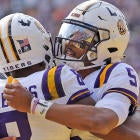Giants President and CEO John Mara surprised the NFL on Sunday at the annual owners meeting by publicly venting his frustration with Odell Beckham, Jr.'s behavior while also declaring the mercurial wide receiver wasn't untouchable. The Giants aren't actively shopping Beckham, whose 2017 season ended after five games because of a broken ankle, but he could be available at the right price. The refusal to unequivocally squash trade talk has fueled speculation that the Rams would be the perfect destination should the Giants deal Beckham, who makes Los Angeles his offseason home.
The Rams have been extremely active in the trade market this offseason. Two-time All-Pro cornerback Marcus Peters and cornerback Aqib Talib, who has been to the last five Pro Bowls, have been acquired respectively from the Chiefs and Broncos. The Rams have already done business with the Giants this offseason. Linebacker Alec Ogletree was sent to New York for fourth and sixth round picks in the upcoming NFL Draft.
Rams head coach Sean McVay didn't refute reports about the team's interest in Beckham on Tuesday. Beckham would be a significant upgrade over Sammy Watkins, who received a three-year, $48 million contract, with $30 million fully guaranteed, from the Chiefs in free agency.
ESPN's Adam Schefter reported on Wednesday that the Giants would want at least two first round picks for Beckham, who is in a contract year on a fifth-year option for $8.459 million. This desired compensation is consistent with Keyshawn Johnson's 2000 trade to the Buccaneers. The Jets received the 13th and 27th overall picks in the 2000 draft. Tampa Bay also signed Johnson to a six-year contract extension averaging $8.216 million when the salary cap was $62.172 million. Johnson's deal adjusted to the current $177.2 million salary cap averages approximately $23.15 million per year.
Seahawks wide receiver Joey Galloway, who had been designated a franchise player, was traded to the Cowboys a couple months before Johnson for 2000 (19th overall) and 2001 (seventh overall) first round picks. He received a six-year, $42 million contract in the process, which equates to almost a $20 million per year deal in the today's cap environment.
Roy Williams signed a six-year, $54 million contract extension containing $19.5 million of guarantees in 2008 after the Cowboys acquired him from the Lions for 2009 first (20th overall), third and sixth round picks. Detroit also sent Dallas a 2010 seventh round pick in the transaction.
Percy Harvin was dealt at the start of free agency in 2013 to the Seahawks from the Vikings for a 2013 first round pick (25th overall), a 2013 seventh round pick and a 2014 third round pick. He promptly received a six-year, $67 million contract with $25.5 million in guarantees from Seahawks. His $12,849,500 new money average under a $123 million salary cap equates to $18.5 million per year extension in 2018.
More recently, The Patriots essentially gave the 32nd overall pick in last year's draft to the Saints for Brandin Cooks. The Rams trade for Watkins and a 2018 sixth round pick last preseason cost them a 2018 second round pick and cornerback E.J. Gaines.
The Giants getting two first round picks for Beckham would be surprising although he is superior to any of the wide receivers involved in these 21st century trades. Beckham arguably had the best first three seasons for a wide receiver in league history. He caught 288 passes (tied for first) for 4,112 yards (second) with 35 touchdowns (tied for fifth) in 43 games. Jerry Rice and Randy Moss are the only wide receivers with comparable production. Beckham is still in the top 10 through four seasons in these categories despite missing 17 out 64 games. Something between the first round picks received for Johnson and Galloway and what was given up for Harvin and Williams wouldn't be unreasonable trade compensation.
Another chapter in the Beckham saga could be written when the Giants start offseason workouts on April 9. New head coach Pat Shurmur expects Beckham to be in attendance. Last offseason, he only showed up for the mandatory three day minicamp in June. Beckham reportedly is going to holdout until he gets a new contract. Although general manager Dave Gettleman said, "You don't quit on talent," when asked about Beckham at the league meetings, it remains to be seen whether skipping workouts again would push the Giants toward a trade before late April's draft.
Acquiring Beckham would instantly make the Rams a trendy pick to dethrone the Eagles as NFL champions. The move would potentially be challenging on numerous levels.
The Rams have less than $5.5 million in 2018 cap space after signing five-time All-Pro defensive tackle Ndamukong Suh to a fully guaranteed one year, $14 million contract with another $1 million in incentives. A team must have enough salary cap room to absorb a player's current salary in order to make a trade. Once the player is acquired, the new team can renegotiate or restructure his contract.
The Rams would need to trade or release players or restructure contracts to acquire Beckham because his 2018 salary is $8.459 million. One solution would be to insist on wide receiver Tavon Austin being included in the trade or releasing him. Beckham would make the 2013 eighth overall pick expendable. Austin recently reworked the head scratching four-year extension averaging approximately $10.5 million per year the Rams gave him in 2016 so he wouldn't be cut. Austin's 2019 through 2021 contract years were eliminated while his 2018 compensation became a $4 million third day of the league year roster bonus (March 16), a fully guaranteed $1 million base salary and $2 million in game day active roster bonuses ($125,000 per game). There's also $1 million in realistically achievable but not likely to be earned incentives. Either way of getting rid of Austin would free up $3 million of cap space because the $4 million roster bonus is a sunk cost.
Otherwise, linebacker Mark Barron ($10 million cap number), defensive lineman Michael Brockers ($11 million cap number), cornerback Aqib Talib ($11 million cap number), offensive tackle Andrew Whitworth ($12,666,666 cap number) and wide receiver Robert Woods ($9 million cap number) are the most logical restructure candidates. Woods is under contract the longest with his deal expiring after the 2021 season.
Beckham reportedly needing a new contract before stepping on the football field again could create an unnecessary problem with Aaron Donald, who was selected one spot after the wide receiver in the first round of the 2014 draft at 13, and/or his representation. That is if Beckham gets a new contract before the reigning NFL Defensive Player of the Year does. The Rams won the battle in a contest of wills last preseason when Donald ended his lengthy holdout without getting a new contract. Although Rams general manager Les Snead has called a new deal for Donald, who is scheduled to make $6.892 million in 2018 on his fifth year option, a major priority, my experience as an agent was clients who were homegrown talents or had a long tenure with a team took issue when outsiders were given favorable treatment contractually.
To a lesser degree, Todd Gurley's camp might also have a similar issue since he is now eligible to receive a contract extension. There's less urgency with his situation because he was drafted a year after Beckham and Donald.
It is expected that Donald will become a charter member of the $20 million per year non-quarterback club on his new deal after he solidified his standing as the league's most disruptive force from the interior of a defensive line without the benefit of training camp. Beckham demanding similar compensation to Donald wouldn't be unreasonable considering the $16 million per year contract the Chiefs just gave Watkins.
One team having two of the league's highest paid non-quarterbacks at the same time would be unusual. The Texans are on the verge of having three with major progress reportedly being made on a "mega extension" for 2014 first overall pick Jadeveon Clowney. He would join three-time NFL Defensive Player of the Year J.J. Watt and wide receiver DeAndre Hopkins as Houston's highly paid non-quarterbacks. It wouldn't be a realistic possibility without the Rams being in an excellent salary cap position in the future and quarterback Jared Goff, 2016's first overall pick, being a bargain on his rookie contract. Goff's 2018 and 2019 cap numbers are slightly over $7.6 million and just under $8.9 million. His fifth year option salary in 2020 could be in the $23 million neighborhood.
The Rams currently have the NFL's second fewest 2019 cap commitments at approximately $90.675 million with 36 players under contract. A similar increase in the cap next year as this year's 6.11 percent would put the 2019 number right around $188 million.
The nearly $100 million in potential cap space is a bit misleading because the top 51 cap numbers matter under offseason accounting rules. Fifth year options for Gurley and Peters, which will surely be exercised, aren't being included among the 2019 cap commitments. Gurley's fifth year salary is $9.63 million while Peters' should be in the $9 million neighborhood. 13 other players to round out the top 51 should take up approximately $7.5 million of cap room. This drops to Rams cap space next year to right around $70 million without even factoring in hefty cap figures for Beckham and Donald. The duo collectively might eat up at least $40 million of cap room since the Rams don't typically structure contracts with a big signing bonus and try to keep cap numbers and cash each year in the same vicinity. A second franchise tag for safety Lamarcus Joyner would be $13,544,400 if he doesn't sign long-term this offseason, which presumably would at least be in the $10 million per year range. Suh could become a one-year rental where he's a luxury the Rams can no longer afford.
It may make sense for Beckham and Donald to take up an inordinate amount of cap room in 2019 and possibly 2020 to provide flexibility to allow for keeping as much of the core roster together. 2020 is pretty much a blank slate cap wise because the 11 players currently under contract account for slightly over $31 million. The 49ers are currently doing this with quarterback Jimmy Garropolo. His $37 million 2018 cap number is $10.5 million more than the next highest cap hit in the NFL. The Rams would run the risk of becoming an extremely top heavy salary team like the Peyton Manning era Colts, who didn't have much depth.
Gurley and Peters would likely be signed to new contracts near or at the top of their positional markets. That might be more than the reported $12 million per year offer Le'Veon Bell rejected from the Steelers last July with Gurley. Peters, who has an NFL best 19 interceptions since making his debut in 2015, is probably going to command a minimum of $15 million per year provided he can put some of the character concerns that led to his trade behind him.
The true game changer could be Jared Goff's contract. He made great strides last season in McVay's first year as head coach. Continued development probably puts Goff in line for a contract in excess of the five-year, $137.5 million deal Jimmy Garoppolo recently received from the 49ers after just a handful of starts. Goff will be eligible for a new deal after the 2018 regular season ends. Waiting until 2020 to pay Goff might require $30 million per year or more as long as he is showing the potential that made him 2016's top pick.
The Browns are another interesting trade option for Beckham because of an abundance of cap room (a league high $72 million) and the presence of his former LSU teammate Jarvis Landry at wide receiver. Landry, who was recently acquired from the Dolphins after being given a $15.982 million franchise tag, has been lobbying for a reunion on social media. It could become a case of be careful what you ask for, you just might get it. The Browns making Beckham one of the league's highest paid non-quarterbacks could make Landry's stay in Cleveland brief one since he also wants top wide receiver money. Most teams don't make that type of long term investment in two wide receivers.
The Giants should seriously consider insisting on Josh Gordon being thrown into any trade made with the Browns because of his tremendous upside and cheap cost. Gordon, who led the NFL with 1,646 receiving yards in 2013, would be the ultimate boom or bust acquisition. Commissioner Roger Goodell finally reinstated Gordon late last season from a suspension under the league's substance abuse policy that had kept him from playing since 2014. Gordon has the ability to be considered one of the game's best wide receivers if his drug and alcohol problems are behind him. He is making $790,000 in 2018 and will be a restricted free agent in 2019. A second round tender for him next year will be between $3.06 million and $3.205 million. He isn't scheduled to become an unrestricted free agent until 2020.






